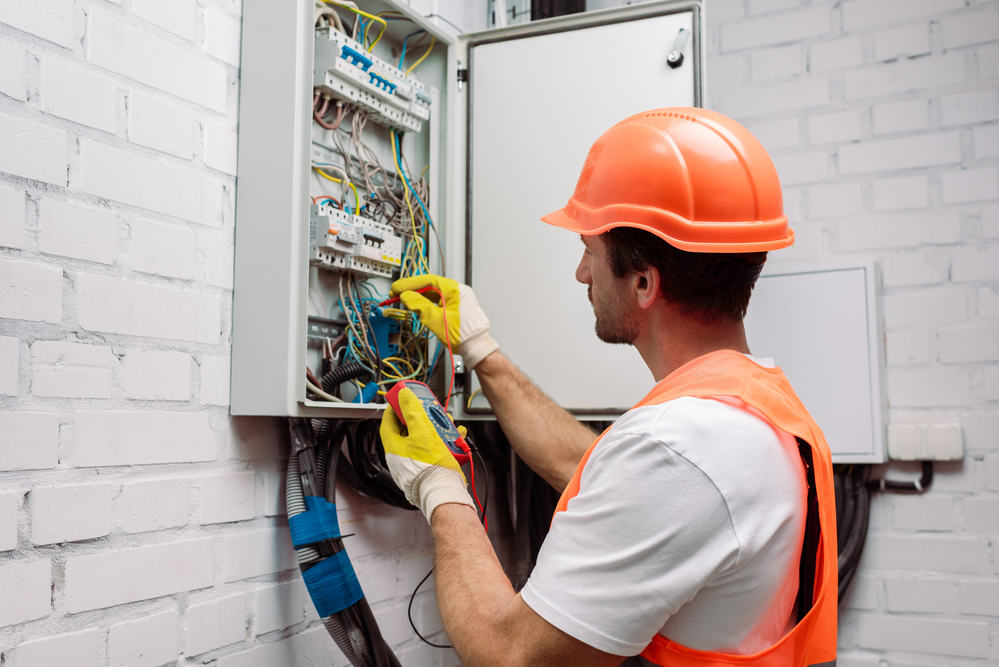Solar System & Battery Back-Up Design & Installation
Are you thinking of installing solar panels at your home? Do you want to use solar power to charge your electric car for free? Concerned about rising electricity costs and how inflation may affect your capacity to afford? Like the thought of never having to pay another power bill?
Providing high-performing PV solar systems, Meridian Home Services is a reputable electrical contracting company with a veteran-led team that operates locally. We provide installation and replacement services for solar panels and batteries, as well as assistance with changes to the electrical infrastructure. Our group may assist you in reaching any project objective, including total zero, yearly net zero, or partial electrical offset, which will completely remove your electricity expense. Please make an appointment with our solutions advisor right now.
Meridian Home Services Installs Battery Backup Systems and PV Solar Systems:
- Electrical inspections, installation, and replacements
- Electrical repairs, installation, and replacements
- Lighting Fixtures installation and replacements
- Doorbell wiring installation and replacements
- Telephone and data cabling installation and replacements
- Computer and television cabling installation and replacements
- HVAC control wiring installation, replacements, and upgrades
- Branch circuit wiring installation, replacements, and upgrades
- Feeder circuit wiring installation, replacements, and upgrades
- Service wiring installation, replacements, and upgrades
- Photovoltaic (PV) solar systems installation and replacements
- Electric vehicle (EV) charging station installations and upgrades
- Ground-fault circuit interrupter (GFCI) installation and replacements
- Arc-fault circuit interrupter (AFCI) installation and replacements
- Whole home surge protection installation and replacements
- Electrical sub-panel installation and replacements
- Electrical panel installation and upgrades
- Electrical service installation and upgrades
- Electrical load calculations

Key Benefits of a Private Solar System at Home:
- Distributed power production plays a role in peak load shifting and utility system resiliency.
- Adaptable design alternatives enabling ground mount or roof mount arrangements.
- Peace of mind with power product guarantees and 25-year warranties.
- Get a federal tax credit for the whole cost of installing solar systems, which includes backup batteries.
- Compared to generators, emergency backup power supplied by solar panels and batteries is quieter.
- During power outages, battery backup to important loads provides longer hours of safe indoor temperatures.
- Reliable energy generation over the long term with few components and no moving parts that break.
- Electric cars may be charged for free at home, which eliminates the need for gasoline for mobility.
- Connect a ground-source heat pump system to provide all of your hot water, heating, and cooling requirements.
- Homes may maintain their connection to the electrical grid thanks to utility integration via net metering.
- Reinvest monthly energy savings to accelerate mortgage payoff by making extra principal loan payments.
- Produce all of the power needed for your house separately to reach net-zero electricity costs.
- Houses built for the future that include a private power plant that gives owners control over the generation of energy
PV Solar Systems – Did You Know
Bell Labs was the first to create photovoltaic (PV) technology, which converts sunlight into power, in 1954. Since then, new developments in technology have kept up the production of panel electricity while optimizing system harvesting. The two areas with the greatest advancements are silicon panel chemistry and module-level power electronics (MLPE), which include micro-inverters and power optimizers. More significantly, since 2010, the cost per kW of installed solar has consistently decreased, providing residential solar projects with a stronger business case.
Utility prices, which include both gas and electricity, are rising at the same time and may fluctuate dramatically in price. According to the US Energy Information Agency (EIA), home energy bills rose by a record 7.5% in 2022 alone. In the future, yearly rate hikes are expected to surpass inflation. The National Renewables Energy Laboratory (NREL) predicts that the electrification of transportation, as well as home heating and hot water production, will cause the demand for electricity to skyrocket over the next several decades, further exacerbating the issue. Many analysts predict that U.S. utility prices will follow a similar path after analyzing the effect electrification has had on energy rates in Europe over the last 20 years. Consumer power bills will undoubtedly rise due to an outdated electrical system that needs billions of dollars to modernize and the fast-rising demand for electricity. The financial case for household solar power only grows stronger as solar prices decline.
Increased frequency of power outages is another unforeseen effect of electrification. Mismatches between the supply and demand of electricity are the cause of many power outages. This is especially true for sporadically producing renewable energy sources like wind and solar electricity. Base power loads are the bare minimum of electricity that is continually added to the grid. Peak load periods and the possible shifting of peak demands as a result of electrification exacerbate demand and production mismatches. More power outages occur in the US than in any other industrialized country as of right now. There are reports of California utilities requesting that homes delay charging electric cars and set up their thermostats to almost 80 degrees on very hot days. These are instances of growing demand and peak load mismatches that are predicted to worsen. In addition to fixed-cost power output, a household PV solar system enhanced with battery storage may provide independent supply during blackouts.
Up to December 31, 2032, a 30% federal tax credit is available for the whole cost of installing photovoltaic (PV) solar systems under the Inflation Reduction Act of 2022, Residential Clean Energy Credit. Only homeowners who buy solar systems are eligible for this credit; those who lease systems are not. This federal tax credit has no maximum amount, unlike earlier incentives, and homeowners may roll over any residual credit into subsequent tax years.
